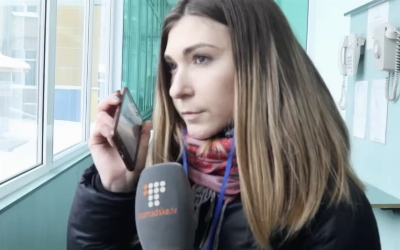Share
Human Rights Voices
While the UN devotes its human rights operations to the demonization of the democratic state of Israel above all others and condemns the United States more often than the vast majority of non-democracies around the world, the voices of real victims around the world must be heard.
Russian Federation, April 29, 2025
‘Numerous signs of torture’: a Ukrainian journalist’s detention and death in Russian prison
Original source
The exchange took place on a lonely forest road in February. Moving along a line of refrigerated lorries, the teams in hazmat suits went about their grim work: preparing the remains of 757 Ukrainian military casualties handed over by Russia for the journey back to Kyiv.
Clipboards in hand, intermediaries from the Red Cross checked their lists. For each body shrouded in white plastic, the Russians had provided a number, a name, a location, sometimes a cause of death. And then, at the very bottom of the last page, a mystery entry: “NM SPAS 757.” The letters were abbreviations, taken to mean “unidentified man” and “extensive damage to the coronary arteries”.
It would be weeks before officials could confirm what the Guardian and its reporting partners are publishing today. The unlabelled remains were those of a woman. Not a soldier, either, but one of the most high-profile civilians detained since the full-scale invasion.
The journalist Viktoriia Roshchyna was captured in the summer of 2023 near the Zaporizhzhia nuclear power station. It was at least her fourth reporting trip into the occupied territories.
She was by this stage of the war the only Ukrainian journalist prepared to risk crossing the frontline in order to pierce the information blackout imposed by Russia.
Roshchyna died after a year in detention, aged 27.
Information on the circumstances of her death is limited. Roshchyna was held without charge and without access to a lawyer. During her detention, her only known contact with the outside world was a four-minute phone call to her parents, a full year after she was taken.
Preliminary forensics suggest “numerous signs of torture”, according to the prosecutor. Burn marks on her feet from electric shocks, abrasions on the hips and head, and a broken rib. Her hair, which she liked to wear long and tinted blonde at the tips, had been shaved.
Sources close to the official investigation have also disclosed that the hyoid bone in her neck was broken. It is the kind of damage that can occur during strangulation. However, the exact cause of death may never be known because when her body was returned during the exchange on 14 February, certain parts were missing, namely the brain, eyes and larynx.
A war crimes investigation has been opened with a view to prosecuting those responsible.
There were also witnesses to her suffering. The Guardian, working with media partners including Roshchyna’s publisher, Ukrainska Pravda, in a collaboration led by the French newsroom Forbidden Stories, has tracked down first-hand testimonies to reconstruct the events that led to Roshchyna’s capture, and the details of her treatment in detention.
This account, part of the Viktoriia project, is part of an investigation into the abduction and systematic torture of what Ukraine believes could be as many as 16,000 of its civilians, the second part of which will be published on Wednesday.
Most of those detained are being held without charge. The conditions of their detention constitute a suspected war crime, and evidence is being gathered for eventual prosecutions.
The detained are aid workers, journalists, business owners, local politicians, church leaders, and anyone suspected of resisting the invasion. They are being held at more than 180 facilities in the occupied territories and inside Russia itself. And yet, in all the noise around peace talks, they are rarely mentioned. It is a subject Roshchyna felt was under-reported, and it was the focus of her last mission.
The information about her final months has been gathered thanks to more than 50 interviews with survivors of Russian captivity as well as the families of some of those still held. Legal sources operating inside Russia and the occupied territories have also shared information, as have prison officials who resigned from the service in distress over what they had witnessed.
While questions remain, one thing is certain: Roshchyna fell victim to the very crimes she had set out to expose...

